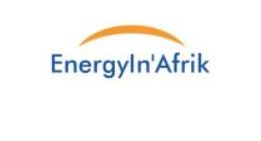Interview with Prof.Dr. Dieter Meissner
Date: 02 – Aout-2017 ; Place: Yaahot Hotel Yaoundé, Cameroon,
During the Summer School on
Sustainable Energetics for Africa (SE4A- School2) organised by the African
Network for Solar Energy- ANSOLE, and held from 31st July to 04th
August 2017 in Cameroon, We had the chance to meet and talk to Prof. Dr. Dieter
Meissner who is the Scientific Coordinator of the ANSOLE summer School SE4A,
and professor of Sustainable Energetics at University of Tallin, Estonia.
After his Oral presentation on
“Overview on Sustainable Energetics”, He accepted to answer to our questions about
the Use of Imported Solar Collectors in Africa.
EnergyIn'Afrik: You mentioned in your presentation that the
use of imported Solar Collectors from China to some African countries means
that we are using imported fossil fuels instead of renewable energy
technologies. Can you explain more on that?
DM: This depends, what kind of solar
collector is imported. I used the example of vacuum tube collectors, which you
can see in many African countries. They are high tech devices developed to
produce temperatures up to 300°C but are sold and used in Africa for warm water
production for example in showers. They are relatively cheap in money, but
their production had cost a large amount of energy, mainly from fossil fuels.
Using them to produce only warm water means, that at the end of their lifetime,
they will have produce much less heat energy (from the sun), than their
production had cost (from fossil fuels). So, what we are actually using here is
(mainly) fossil fuel energy from China.
EnergyIn'Afrik: What can be the explanation to this situation
from those African countries side? Is it due to lack of awareness, information
or knowledge?
DM: Very few people analyze the total
energy input into the energy system including production and final disposal or
(hopefully) recycling. So, I think it is mainly lack of information.
EnergyIn'Afrik: What is the share of responsibilities regarding
this situation? On who is the blame?
DM: It is the history. In the past,
when the teachers of today were still students, energy was very cheap, nearly
for free. So the use of energy played nearly no role, so also in engineering
education it was neglected. Analysing the energetic costs of devices started
only very recent times.
EnergyIn'Afrik: In your opinion, what will be in long term,
the consequences of such situation if appropriate measures are not put in
place? Consequences of “Importing fossil fuel technologies hidden as renewable
technologies” from China to Africa as at present and in future?
DM: I am pessimistic about already
the nearer future (that of my children and grand-children). The climate change
caused by burning fossil fuels will lead to more migrations, conflicts, and wars,
which with all the weapon of mass destruction threaten the survival of human
kind, at least of high culture. I see the only change in locally adapted
solutions run by the people for the people, decentralized (PV-based) energy
systems (mini-grids).
EnergyIn'Afrik: What are your recommendations for changing
this situation?
DM: Decentralized solutions based on
locally produced systems. For solar energy utilization no high efficiency is
needed due to abundant supply at least in Africa. So every country can produce
at least PV modules and solar collectors.
EnergyIn'Afrik: Thank you for your time Prof. Dieter
DM: Thank you. It's been a pleasure. Good Luck for your Blog and other activities!
Biography of the Interviewee
Prof.Dr. Dieter Meissner studied Chemistry,
Biology, Philosophy and Pedagogics in Hamburg and Southampton. He obtained his
PhD in Physical Chemistry at the University of Hamburg Germany. He is a
Professor of Sustainable Energetics at Tallinn University of Technology (TTU),
Estonia. He is also Chief Scientist at Crystalsol GmbH, Austria and Crystalsol
OÜ, Estonia, spin-out companies of TTU he founded in 2008. Meissner’s main
research interests are photoelectrochemistry, photovoltaics, and materials
research and development.
Meissner published more than 170 papers in
refereed scientific journals, and 150 papers in proceeding volumes. He has more
than 150 patents. He edited and co-edited two books. During his academic
career, Meissner developed two universities curricula: the Eco-Energy
Engineering curricula at the University of Applied Sciences, Austria, and Tartu
University, and Tallinn University of Technology.
He taught at many universities, including the
University of Hamburg Germany, Osaka University, Japan, University Buenos
Aires, Argentina, Technion Haifa, Israel, Johannes Kepler University Linz,
Austria and Tallinn University of Technology, Estonia.
Meissner is the initiator, founder and
co-founder of five university spin-out companies, namely AQR consulting, Wels,
Austria, ALPPS Fuel Cell Systems GmbH (fuel cells), Graz, Austria, Solar
Surface, (Selective Absorbers), Linz, Austria, crytalsol OÜ (PV solar cell
powders), Tallinn, Estonia, crystalsol GmbH (PV modules), Vienna, Austria.
Contact: profdieter@gmail.com



No comments:
Post a Comment